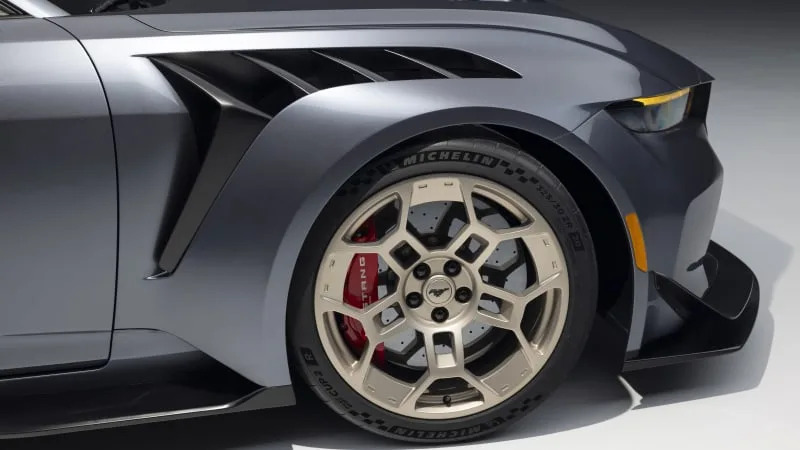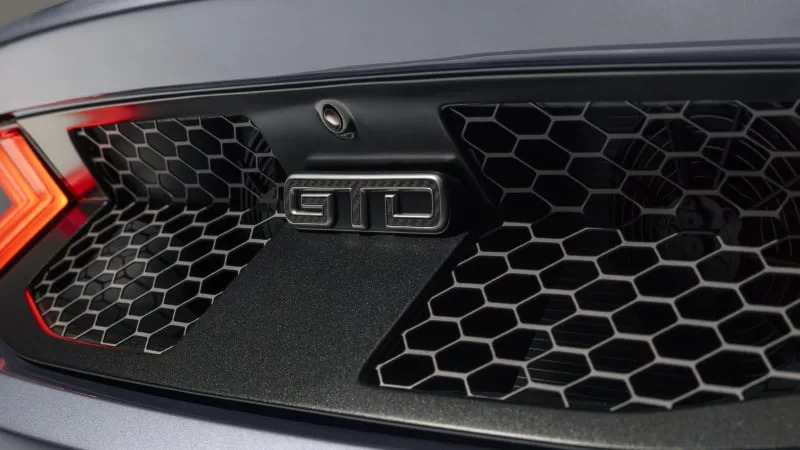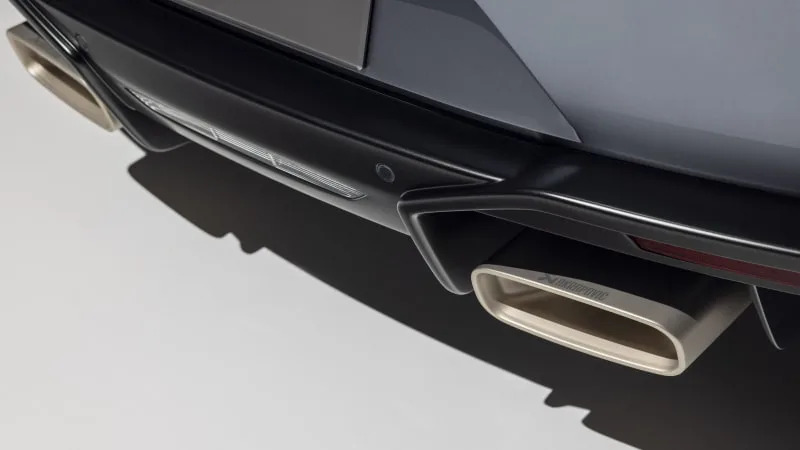There’s never been a Mustang quite like this: The 2025 Ford Mustang GTD. If you thought the next chapter of this latest generation of ‘stang was a Shelby variant or two, you’d be wrong, because Ford just pulled the wraps off what is easily the most impressive vehicle to ever wear the pony logo, and there isn’t a Shelby badge to be found.
The first thing you need to understand is that this Mustang GTD has very little in common with the EcoBoost or GT you’ll see on the road soon. And while some of its bones may start life at the Flat Rock Assembly Plant, the majority of the vehicle will be hand-assembled at Multimatic’s facilities in Markham, Canada. Yes, that’s where the Ford GT was built, and the Mustang GTD – which gets its name from the IMSA’s GTD racing class for cars built to GT3 specification – is being built in the same place for similar reasons.
This monster of a Mustang was engineered and developed between both Ford and Multimatic (alongside the GT3 race car) as a super-secret project that began in 2021, and just like the GT, Ford’s done an exceptional job of keeping things under wraps until now. One look front-to-back is all you need to tell that its exterior is unique versus the regular Mustang. Nearly every body part is (or can be optionally made) carbon fiber.



And wow, get a load of that aero package. Ford says every line and opening you see has a purpose, from the vented front fenders to the C-pillar mounted rear wing. And oh yeah, that wing is hydraulically controlled to best suit the car’s aero profile in real time. In addition to all of the visual extremities, Ford will be offering a carbon fiber underbody aero package that uses hydraulically controlled front flaps for even better lap times. The only indicator of how fast the GTD will be around a racetrack is Ford bragging that it will be capable of a sub-7-minute Nürburgring time. Hello, Porsche and company.
As you’d expect from any halo Mustang project, the beast of an engine under the hood is just as impressive as everything else. The GTD is packing an improved version of the 5.2-liter supercharged V8 found in the previous generation Shelby GT500 that Ford says will deliver “more than 800 horsepower” and rev to 7,500 rpm. To better handle extreme track use, Ford developed a new dry-sump oil system, which is the first of its kind to be fitted to a road-legal Mustang. The extra power over the previous-gen GT500 comes from a revised supercharger system with a new pulley and unique engine tuning. It also breathes through a new (and optional) titanium Akrapovic exhaust system. All that power is sent via a carbon fiber driveshaft to the rear wheels to an eight-speed dual-clutch rear transaxle, which Ford credits as the reason it has a 50/50 weight distribution now.
The “race car for the road” theme continues with the GTD’s unique suspension system. There is no trunk in this Mustang. Instead, under the decklid cover you’ll find the GTD’s semi-active suspension, a hydraulic control system and the transaxle’s cooling system. Just like the Ford GT, this Mustang uses Multimatic’s exotic adaptive spool valve damper technology with hydraulically actuated dual spring rate and height control. At the touch of a button, you can put the GTD into “Track Mode” and lower the ride height by nearly 40 mm.
The front suspension features a short-long-arm design for better lateral stiffness in high-G cornering, and the rear utilizes an integral link pushrod and rocker arm architecture, all integrated with a motorsport-style tubular subframe. Did we mention yet that this this thing is basically a race car?
Ford says the GTD’s track width is four inches more than the Mustang GT, and the amount of rubber on the road is vastly increased, as well. Ford fits Michelin Pilot Sport Cup 2 R rubber in 325-section-width up front and 345-section-width out back, and these ultra-sticky tires are wrapping 20-inch forged aluminum wheels as standard. If you want even cooler wheels, Ford says you can optionally tack on forged magnesium wheels that save weight and are designed for durability on the track — their design is similar to the Mustang GT3 race car. Hauling everything to a stop is a massive Brembo carbon ceramic brake package. And if things get a little hairy, Ford says it’s developed a new “Variable Traction Control” system in track mode that allows for adjustments via the steering wheel.
“This is our company, we’re throwing down the gauntlet and saying, ‘Come and get it,’” Jim Farley, Ford CEO, says. “We’re comfortable putting everybody else on notice. I’ll take track time in a Mustang GTD against any other auto boss in their best road car.”
Heady words, but we’ve come to expect the competitive spirit of Farley, who is one of the rare CEOs who also races competitively.
For the time being, Ford is depriving us of interior photos, but at least we have a description to go off. Ford says the interior uses materials like Miko suede, leather and carbon fiber. The same digital displays as you see in the current Mustang are said to be here, and Recaro seats made for extensive track use are standard. Of course, there are no rear seats for weight savings. As a neat easter egg, the titanium used for the paddle shifters, rotary dial shifter and serial plate inside the car is üsourced from parts off retired Lockheed Martin F-22 jets.

When it comes to colors, Ford says you’ll be able to have your Mustang GTD painted in whatever shade you want, going so far as saying a customer can pick a color, and Ford will match it with paint. The interior is said to be offered in “multiple color combinations,” but we’re not sure what those will be quite yet.
As you might expect, the Mustang GTD won’t be cheap. It’s expected to have a starting MSRP of “approximately $300,000.” That will make it the most expensive road-going Mustang ever, and it’s not even close. The first examples are expected to ship in late 2024 and early 2025. If you want one, Ford says it will be opening up an application process similar to what was offered to folks buying the Ford GT. Production quantities are still anybody’s guess, because all Ford will say is that the GTD will be “limited production.”
Read the full article here


